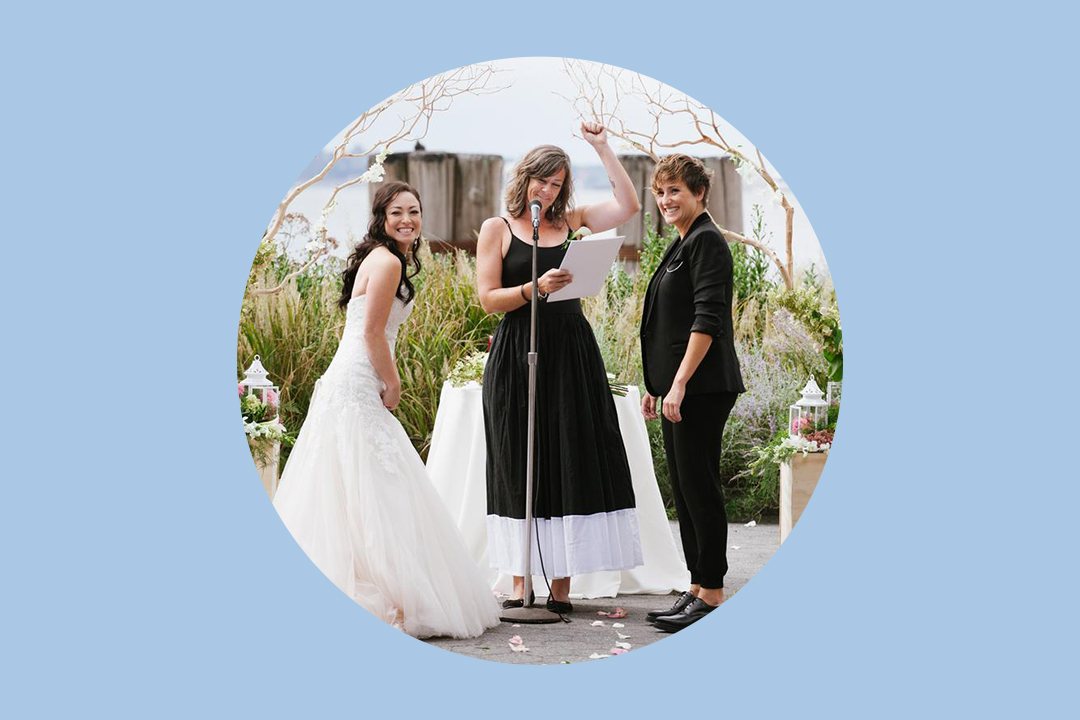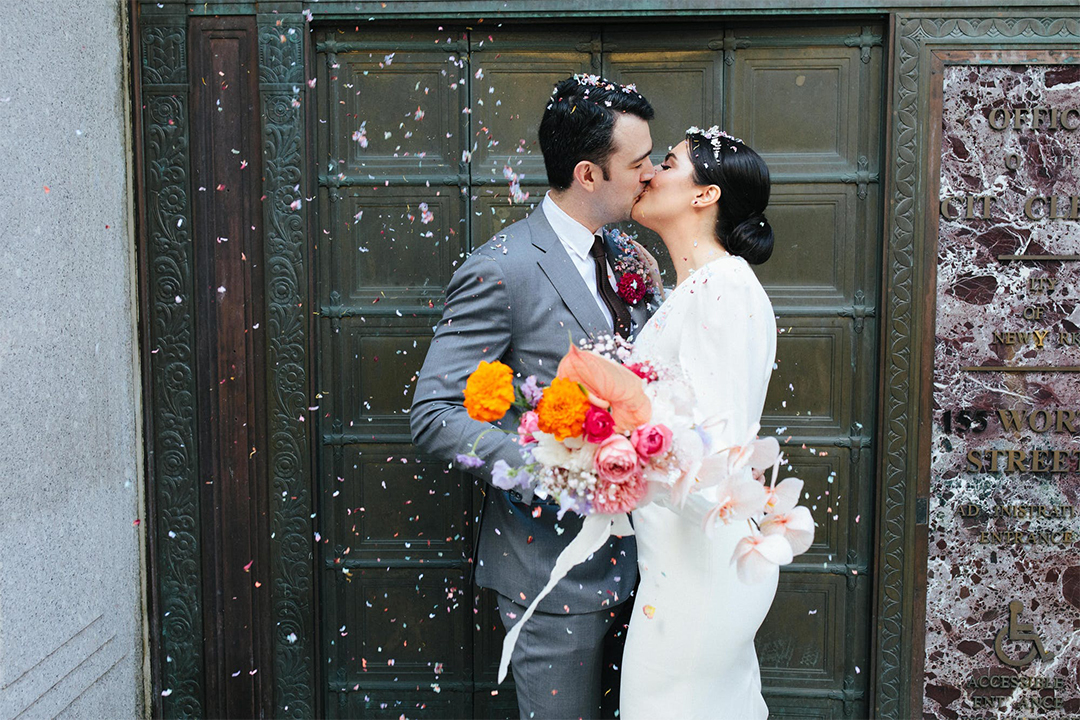- Expert advice/
- Wedding planning 101/
- Wedding planning questions/
- Are You Supposed to Tip Your Wedding Officiant?
- Wedding planning questions
Are You Supposed to Tip Your Wedding Officiant?
Wondering if you should tip your wedding officiant? Whether they're a religious, professional, or civil officiant, here's everything you need to know before deciding on this gesture.
Last updated February 5, 2024

The First Look ✨
- Choosing the right person to oversee your wedding ceremony is a big decision. Once you've settled on one, you’ll have even more to consider—like the topic of tipping.
- Tipping is always a nice gesture to show your gratitude, however if your officiant is a member of the clergy, for example, they cannot accept tips. Consider donating to the religious organization your officiant is associated with instead.
- Knowing how much to tip is another thing to consider. The general rule of thumb for people who perform professional services is usually 18 to 25 percent of the total amount.
When you’re wedding planning, there are a million little details to keep track of. Once you've booked the wedding venue and the vast majority of your vendors, there’s one other thing to do: hire a wedding officiant.
What is an Officiant’s Job?
Whether they are religious or secular, the officiant assists the couple in the months leading up to the ceremony. They work with them on various details of the wedding day ceremony, from the vows, to the music selections, to other kinds of readings. They also often help the couple get counseling prior to getting married.
When it comes to the officiant, they must be legally ordained in order to oversee the ceremony in the state you wish to get married in. On your big day, your officiant will have the task of signing and filling out your marriage license in front of other witnesses. From there, it will be sent to the county clerk's office to be certified.
Although this doesn't sound like a big deal, if you don't have a marriage license, then in the eyes of the law, your marriage won't be recognized. In other words, even if you had the ceremony, unless you have the wedding license, you won’t really be married.
What Kind of Wedding Officiant Can You Have?
When it comes to your wedding, one of the first things you and your partner have to decide is the kind of officiant you want to oversee it. There are a wide number of options to consider—and a lot of this will depend on your personal and religious background and preferences. And if you’re not religious, there are other non-denominational people who can officiate and help you achieve the wedding of your dreams. Once you decide on the kind of officiant, this will also determine if you should tip or not.
Here are some of the various kinds of wedding officiants you can consider for your big day.
Civil Wedding Officiant
This is the kind of officiant who has a role in the government and is also able to legally perform a wedding ceremony in the state they’re in. Depending on the kind of officiant they are, they can also be referred to by a number of titles, including a justice of the peace, judge, mayor, city clerk, notary, or magistrate. They typically oversee ceremonies in a number of government settings, too––like a courthouse wedding, for example.
The advantage of hiring a civil officiant is that they can perform a nonreligious ceremony that’s legally binding. For folks who choose to marry abroad where the laws are different, you’ll also need to have a legal secular ceremony when you get back with a civil servant to oversee it, so that your wedding is legally bound in the country where you reside.
Religious Wedding Officiant
The main thing with a religious wedding officiant is that they are leaders within a specific kind of faith/religion and will generally only perform a wedding ceremony at their place of worship. Some common names for these kinds of religious officials include rabbi, priest, imam, pastor, reverend, and minister. All of these individuals can perform the kind of wedding ceremony you want and will sign your marriage certificate—as long as you do so in their house of worship.
Depending on the religious affiliation, sometimes—upon request—these individuals will perform the ceremony elsewhere. Some couples will have their pastor, for example, perform a ceremony at a park, the beach, or in another venue. That said, some religious officials like a Catholic priest, for example, may not be able to perform a wedding ceremony outside of their place of worship. Remember to double-check these details when booking your officiant.
Professional Wedding Officiants
Another option for people who don't want a civil or religious officiant is a professional officiant. These individuals, often called celebrants, are licensed professionals hired to perform your wedding ceremony. They generally have a lot of experience in performing all types of ceremonies—secular, spiritual and interfaith—but often specialize in one particular area.
They can also assist with your wedding vows in terms of how to approach them, what to write, and even practicing them. And they can also give you flexibility in terms of the range of things you may want to include in your ceremony.
To ensure it’s as special and personal as you’d like, be sure to meet with your prospective officiant ahead of time—and come ready with your questions. You want the right fit for your wedding, and taking the time to find someone who can help create the kind of ceremony you and your partner want is important.
Ordained Wedding Officiant
There are a lot of advantages to hiring a professional wedding officiant to conduct your ceremony, but some people prefer to have a loved one oversee it. If that’s the case, the person you intend to ask will need to be ordained.
If they aren't ordained, you can usually apply online with an easy form and pay a fee. Just keep in mind: Some states don’t recognize online ordinations, so be sure to double-check the marriage laws in your state before the person you ask goes through the process.
Should I Tip My Wedding Officiant?
When it comes to your wedding officiant, there are a few things to keep in mind. One of the major ones is the kind of officiant you’ve chosen to oversee your wedding. If you’ve hired a civil, professional, or religious officiant, tipping is a thoughtful gesture. Officials play a huge role in your wedding and work very closely with you—often for months leading up to your big day.
Tipping is a very nice way to show your appreciation for their time and effort. Going the extra mile to show your gratitude for their contribution to your big day is always an extremely nice gesture. While it’s not expected, giving them a tip is always an added bonus.
Don’t forget: Depending on the kind of officiant you hire, they may not be able to accept a tip. For example, a member of the clergy cannot take tips. If you find yourself in that position, the next best thing you can do is to make a donation to the church or religious organization they’re associated with.
Another instance where tipping might not make sense? If your wedding officiant is a close family friend or even a family member. Instead, you might choose to show your appreciation by sending a card or buying them dinner or a small gift.
How Much Should I Tip?
If you’re thinking about tipping your officiant, $50 to $100 is typically fair. Alternatively, if you and your officiant had a contracted fee, you can apply a 15 to 25 percent tip to that total.
If your officiant is a clergy member or has another religious association that prevents them from accepting a tip, you can also donate a similar amount to the organization they’re involved with.
What’s the Best Way to Tip?
If you feel comfortable doing so, you can feel free to tip your officiant directly after your ceremony. Planning ahead pays, since you can collect the necessary cash before the big day. For convenience, you can also use electronic payment apps such as Venmo or PayPal if your officiant uses those.
If you’re making a donation, be sure to write a check to the correct organization. You can also make it on behalf of the officiant's name as well.
Tipping is always a gesture that shows the person or wedding vendor you appreciate their time and efforts. And for someone like a wedding officiant, tipping can be a really great way to thank them for how they helped make your wedding day even more special.
Up next for you

Do You Tip Wedding Cake Delivery Staff?
Advice
Should you tip for your wedding cake deliverers? Find out why the answer is yes, plus learn how much and exactly how to do it.

Not Inviting Family to Your Wedding: Do's and Don'ts
How-To
When creating your wedding guest list, you have to decide what family members to invite to your special day.

Half Up Half Down Wedding Hair: 20 Hairstyles We Love
How-To
Bridal hair is an important component of your overall wedding look. Half-up wedding hairstyles are a good middle ground for brides looking for a formal look without fussiness.

Guests, Weddings, and Vaccines: What You Need to Know
Advice
Attending a wedding this summer? Here’s everything you need to know about guests, weddings, and vaccines.
Featured

Do You Tip Wedding Delivery Staff?
Advice
To be brief, yes—here’s all of the whys, whos, whens, and hows of tipping your wedding delivery staff.

How much does the average wedding cost in 2025?
Advice
Stay within your wedding budget! See average wedding cost breakdowns by state, guest size, and vendor service, plus money-saving tips from the experts.

How Much to Tip Wedding Photographers
Advice
Navigate wedding photographer tipping etiquette effortlessly. Discover guidelines and advice on how much to tip to show appreciation for their exceptional work.

A Guide to Wedding Hair & Makeup Costs
Inspiration
How much does a professional wedding hair & makeup artist cost? Find out with our ultimate guide to wedding hair and makeup costs.
- Expert advice/
- Wedding planning 101/
- Wedding planning questions/
- Are You Supposed to Tip Your Wedding Officiant?
Find even more wedding ideas, inspo, tips, and tricks
We’ve got wedding planning advice on everything from save the dates to wedding cakes.
